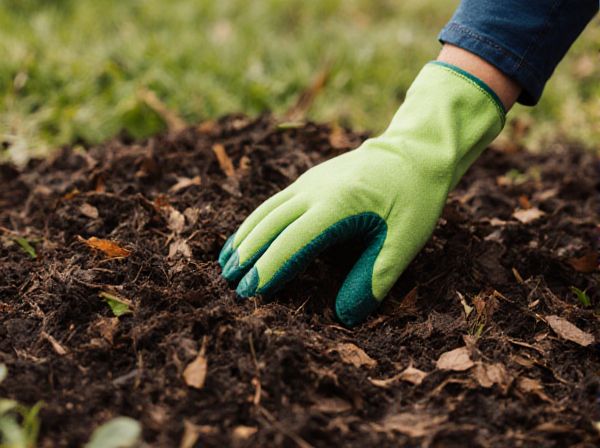
Fresh mulch vs aged mulch Illustration
Fresh mulch provides a rich, vibrant appearance but may temporarily tie up nitrogen in the soil as it decomposes, potentially affecting plant growth. Aged mulch offers the advantage of improved soil integration and reduced risk of nitrogen depletion, promoting healthier plant roots. Choosing between fresh and aged mulch depends on immediate aesthetic goals and long-term soil health considerations.
Table of Comparison
| Feature | Fresh Mulch | Aged Mulch |
|---|---|---|
| Appearance | Vibrant color, fresh texture | Faded color, crumbly texture |
| Decomposition Level | Low, retains original structure | High, breaks down easily |
| Nutrient Content | Limited nutrients, possible nitrogen draw | Rich in nutrients, promotes soil health |
| Weed Control | Effective initial barrier | Less effective over time |
| Moisture Retention | Good, retains water well | Moderate, absorbs less moisture |
| Usage Recommendation | Ideal for immediate aesthetic and weed control | Best for soil enrichment and long-term health |
Understanding Fresh Mulch: Characteristics and Benefits
Fresh mulch consists of recently processed organic materials like wood chips or bark, offering high nutrient content and strong moisture retention. Its rich carbon content promotes soil microbial activity that enhances plant root growth and soil health. Fresh mulch also provides effective weed suppression and helps regulate soil temperature, creating an ideal environment for plant development.
Exploring Aged Mulch: Key Features and Advantages
Aged mulch offers enhanced decomposition, providing a richer nutrient profile that improves soil health and plant growth. Its stabilized organic matter reduces the risk of nitrogen depletion commonly associated with fresh mulch application. Using aged mulch also promotes better moisture retention and weed suppression, making it a preferred choice for sustainable landscaping.
Nutrient Release: How Fresh and Aged Mulch Differ
Fresh mulch releases nutrients slowly as it breaks down, providing a steady supply of nitrogen, phosphorus, and potassium that supports early plant growth. Aged mulch has already undergone significant decomposition, making nutrients more readily available for immediate absorption by plants. This difference influences soil fertility and the timing of nutrient uptake, impacting garden health and productivity.
Impact on Soil Health: Fresh vs Aged Mulch
Fresh mulch contains higher moisture and nutrient levels that can initially stimulate microbial activity but may temporarily immobilize nitrogen, affecting plant nutrient availability. Aged mulch, having undergone partial decomposition, provides more stable organic matter that enhances soil structure, moisture retention, and long-term nutrient release. Using aged mulch is generally beneficial for soil health as it supports a balanced microbial ecosystem and improves nutrient cycling without causing nitrogen depletion.
Weed Suppression: Comparing Mulch Types
Fresh mulch provides effective immediate weed suppression due to its dense coverage that blocks sunlight, preventing weed seed germination. Aged mulch, while less dense, offers longer-lasting benefits as it decomposes slowly, enriching soil quality and discouraging weed growth over time. Selecting between fresh and aged mulch depends on balancing short-term weed control with soil health enhancement.
Mulch and Moisture Retention: Which Is Better?
Fresh mulch retains moisture efficiently due to its higher organic content and ability to absorb water quickly, promoting healthy soil hydration. Aged mulch, however, offers improved soil aeration and gradual moisture release as it decomposes, enhancing long-term moisture retention. Choosing between fresh and aged mulch depends on the specific moisture needs and soil conditions of the garden.
Potential Drawbacks: Fresh vs Aged Mulch Risks
Fresh mulch can temporarily deplete soil nitrogen during decomposition, potentially stressing plants, while aged mulch has already undergone much of this process, reducing that risk. Fresh mulch may also harbor weed seeds and pathogens since it has not been exposed long enough to natural degradation. Aged mulch provides better soil insulation and moisture retention with fewer negatives, making it generally safer for established plants.
Application Tips for Fresh and Aged Mulch
Fresh mulch retains high moisture and nutrients, making it ideal for immediate soil protection and weed suppression, but it requires periodic monitoring to prevent nitrogen depletion in plants. Aged mulch offers a more stable composition, promoting beneficial microbial activity and improved soil structure, suitable for long-term garden beds and perennial plants. When applying fresh mulch, spread it in a thin, even layer and water thoroughly to enhance decomposition, while aged mulch can be applied thicker to provide sustained insulation and moisture retention.
Best Garden Uses: Matching Mulch Type to Plant Needs
Fresh mulch offers high nitrogen content ideal for nutrient-hungry annuals, while aged mulch provides a more stable, decomposed organic matter suited for established perennials and shrubs requiring steady moisture retention. Using fresh mulch around vegetable gardens promotes rapid growth by enriching the soil, whereas aged mulch works best in flower beds to improve soil structure and prevent weed growth. Matching mulch freshness to plant needs enhances root development, soil health, and overall garden productivity.
Sustainability and Sourcing: Choosing the Right Mulch
Fresh mulch, sourced from recently processed organic materials, offers rapid nutrient release and effective moisture retention but may require sustainable harvesting practices to minimize environmental impact. Aged mulch, derived from composted or naturally decomposed sources, promotes soil health through enhanced microbial activity and reduced nitrogen depletion, typically supporting circular economy principles. Selecting the right mulch involves balancing immediate soil benefits with long-term sustainability, prioritizing locally sourced, renewable materials to reduce carbon footprint and preserve ecosystem integrity.
Fresh mulch vs aged mulch Infographic

 gardendif.com
gardendif.com